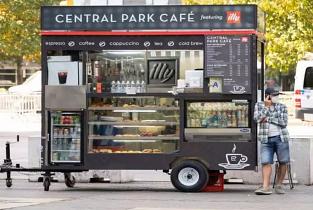NYC food trucks are a microcosm of the changed economy. Mondays and Fridays are their slowest days and many have changed locations.
Before the pandemic, stopping at a food truck on the way to and from work was a New York City staple. But the work-from-home economy changed that, and vendors are suffering.
Even as the economy is slowly returning to normal, office culture may never return to what it once was, given that many companies are now offering employees the option of continuing to work from home. The food-truck vendors who rely on business from workers commuting are worried their sales may never be as strong as they once were.
Nicko Karagiorgos, the owner of Midtown Manhattan's Uncle Gussy's food truck, told The New York Times that even as more employees are returning to work and tourists are reappearing in the city, business is still not at pre-pandemic levels.
"I'm never going to make what I made pre-Covid again. That's game over," Karagiorgos, 44, told the Times. "We have to accept that and hustle a little harder. This is a young man's game. The hours are long. I'm on my feet all day, but I'll do anything. If you want me to juggle, I'll juggle."
He added that Mondays and Fridays are the worst days for business because fewer people tend to go into the office on those days; those might become permanent work-from-home days in a hybrid economy.
And the profit losses are significant. MD Alam said he pays $18,000 every two years to the person who holds the permit to operate Royal Grill Halal Food, his food cart. Before the pandemic, he racked up $3,000 a day, but now, he's barely making $50 a day in profits after paying the $350 operating expense.




